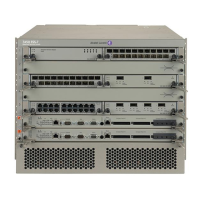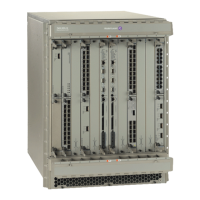Label Distribution Protocol
7450 ESS MPLS Guide Page 597
of session in OvLd for fec-type=MulticastMP2mp
Num Entities OLoad (FEC: MP2MP DOWN ): Sent: 0 Rcvd: 0 <----- // #
of session in OvLd for fec-type=MulticastMP2mp
Num Active Adjacencies: 9
Num Interfaces: 6 Num Active Interfaces: 6
Num OLoad Interfaces: 0 <----- // link LDP interfaces in resource exhaus-
tion should be zero when Overload Protection Capability is supported
Num Targ Sessions: 72 Num Active Targ Sess: 67
Num OLoad Targ Sessions: 0 <----- // T-LDP peers in resource exhaustion should
be zero if Overload Protection Capability is supported
Num Addr FECs Rcvd: 8667 Num Addr FECs Sent: 91
Num Addr Fecs OLoad: 1 <----- // # of local/
remote unicast Fecs in Overload
Num Svc FECs Rcvd: 3111 Num Svc FECs Sent: 0
Num Svc FECs OLoad: 0 <----- // # of local/
remote service Fecs in Overload
Num mcast FECs Rcvd: 0 Num Mcast FECs Sent: 0
Num mcast FECs OLoad: 0 <----- // # of local/
remote multicast Fecs in Overload
Num MAC Flush Rcvd: 0 Num MAC Flush Sent: 0
When at least one local FEC has been set in overload the following trap will occur:
69999 2013/07/17 16:06:59.21 PST MINOR: LDP #2002 Base LDP Resources Exhausted "Instance
state changed - vRtrID: 1, administrative state: inService, operational state: inService"
Step 3
After the user has detected that at least one overload status TLV has been sent or received by the
LSR, he/she must protect the router by applying one or more of the following to free resources up:
• Identify the source for the [unicast/multicast/service] FEC flooding. This is most likely
the LSRs which session received the overload status TLV.
• Configure the appropriate [import/export] policies and/or delete the excess [unicast/
multicast/service] FECs from the FEC type in overload.
Step 4
Next, the user has to manually attempt to clear the overload state on the affected sessions and for
the affected FEC types and allow the router to clear the overload status TLV to its peers.
Please note that due to the dynamic nature of FEC distribution and resolution by LSR nodes, one
cannot predict exactly which sessions and which FECs will be cleared after performing the
following commands if the LSR activates overload again.
One of the following commands can be used depending if the user wants to clear all sessions or at
once or one session at a time:
- [clear router ldp resource-failures]
• Clears the overload state for the affected sessions and FEC types.
